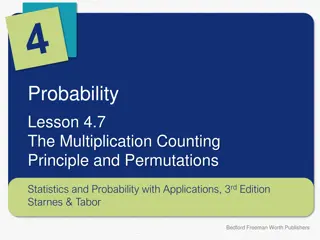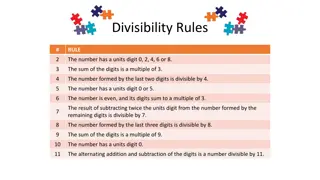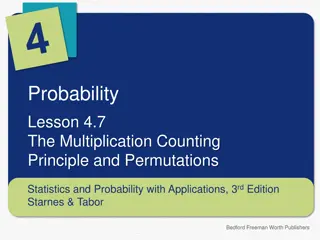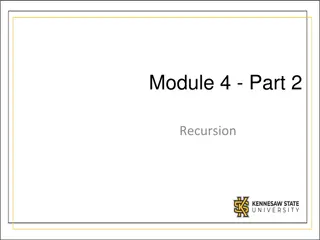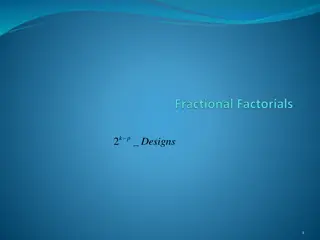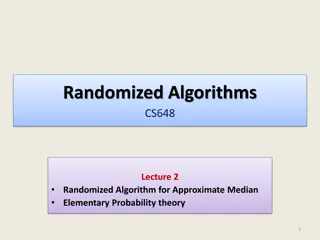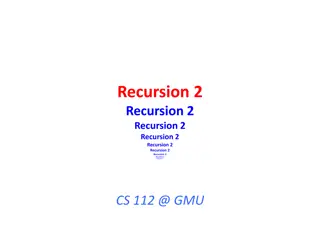Design and Analysis of Engineering Experiments in Practice
Explore the fundamentals of engineering experiments, including blocking and confounding systems for two-level factorials. Learn about replicated and unreplicated designs, the importance of blocking in a replicated design, ANOVA for blocked designs, and considerations for confounding in blocks. Dive
0 views • 15 slides
Understanding the Multiplication Counting Principle in Probability
The Multiplication Counting Principle and Permutations play a crucial role in determining the number of possible outcomes in various processes. This lesson covers how to use factorials to count permutations, compute arrangements of individuals, and apply the multiplication counting principle to dete
0 views • 14 slides
Understanding Divisibility Rules for Quick Math Solutions
Learn about various rules of divisibility such as checking if a number is divisible by 2, 3, 4, 5, 7, 8, 9, 11, and finding factors. Explore examples like forming multiples of 4 with digits 2, 4, 6, and 8, determining the number of zeros in factorials, and finding the greatest number dividing six co
1 views • 4 slides
The Multiplication Counting Principle in Probability: Exploring Permutations
Exploring the multiplication counting principle in probability, this lesson delves into determining the number of ways to complete a process involving multiple steps. Using factorials for permutations, the content showcases how to compute permutations of individuals taken at a time. Through examples
0 views • 20 slides
Understanding Recursive and Iterative Factorials through Tracing
This content provides an in-depth exploration of recursive and iterative factorial functions through tracing examples. The explanations are accompanied by visual aids to help conceptualize the iterative and recursive processes of calculating factorials. By comparing the two methods side by side, rea
0 views • 7 slides
Understanding Recursion in Programming
Recursion in programming involves a method calling itself to solve problems by breaking them down into simpler subproblems. The process requires a base condition, recursive calls, and progress towards termination. This technique is illustrated through examples like calculating factorials using recur
0 views • 64 slides
Understanding Fractional Factorials in Experimental Designs
Explore the concept of fractional factorials in experimental designs, including the basics, factors, terms estimation, confounding, and practical considerations for running treatment combinations. Learn how to generate incomplete blocks, use orthogonal contrasts, identify confounded terms, and alloc
0 views • 24 slides
Randomized Algorithms for Approximate Median with Elementary Probability
This content covers a lecture on a randomized algorithm for finding an approximate median element using elementary probability theory. It discusses the importance of insight and basic probability in designing and analyzing such algorithms. The lecture presents a simple probability exercise involving
0 views • 25 slides
Understanding Recursion: A Fundamental Concept in Computer Science
Recursion is a fundamental concept in computer science that involves solving problems by breaking them down into smaller, similar subproblems. This content delves into the basics of recursion, highlighting key components such as the recursive case and base case. It also explores the concept of facto
0 views • 35 slides

